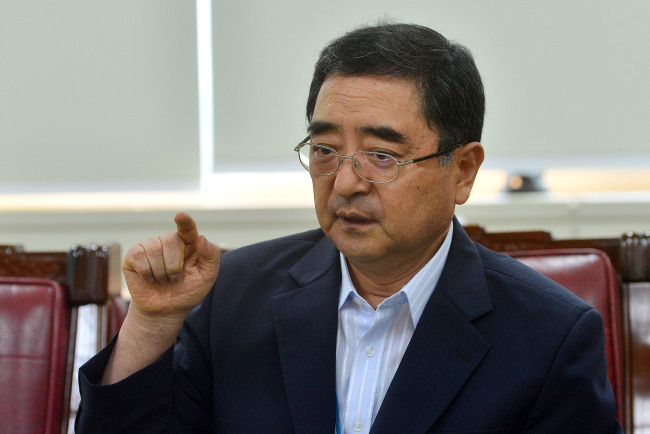U.S. military reform offers lesson to South Korea: analyst
Security expert says Seoul should focus more on efficiency, interservice cooperation
By Korea HeraldPublished : Sept. 23, 2013 - 21:33
The key targets of the current deficit-driven U.S. military transformation are efficiency and inter-service cooperation ― crucial areas that South Korea’s armed forces should also focus on to better defend against North Korea, a security expert said.
In a recent interview with The Korea Herald, Ohm Tae-am, a senior research fellow at the state-run Korea Institute for Defense Analyses, also said Washington’s pursuit of a lighter and more agile military was unlikely to undermine the alliance’s foremost role of peninsular defense.
In a recent interview with The Korea Herald, Ohm Tae-am, a senior research fellow at the state-run Korea Institute for Defense Analyses, also said Washington’s pursuit of a lighter and more agile military was unlikely to undermine the alliance’s foremost role of peninsular defense.

“The U.S. has been seeking to reduce ground forces and pursuing lighter, modular units that are more rapidly deployable to prepare against a wide range of conflicts,” he said at the institute in northern Seoul.
“All these changes would be made in a direction that further strengthens U.S. firepower, which would not put the alliance at a disadvantage (in terms of deterrence against North Korea).”
Ohm was referring to Washington’s efforts to reorganize its traditionally division-centered military into a brigade-based “modular” force, which would be more flexible and versatile to tackle regional and global security challenges.
In line with this, the U.S. Forces Korea would also undergo some shifts in its force management, operational tactics and strategies, Ohm pointed out.
“During the war in Iraq, the U.S. did not change the contours of the 28,500-strong USFK in a show of its support for the alliance. Yet keeping them intact might no longer be easy with Washington transitioning its forces into brigade combat teams,” he said.
“As long as the alliance can continue to maintain an adequate level of deterrence, Seoul does not need to oppose the current direction of the U.S. forces management. It doesn’t have to call on American forces to be fixated on the peninsula, either.”
Amid a flurry of U.S. efforts to reinvent its military, Seoul has not been able to effectively carry out a series of military enhancement plans due to political, diplomatic and financial variables, Ohm noted.
“It is quite disheartening to see that many of South Korea’s previous plans to revamp the military petered out due to a lack of budget, North Korea-related factors and other external influences,” he said.
“I hope Seoul can keep pace with its ally Washington, in terms of military modernization in the face of various types of security challenges of the 21st century.”
Touching on the renewed proposal to delay Seoul’s retaking of wartime operational control, Ohm said it is better to proceed with the current 2015 timetable.
“In my personal view, on the premise that the U.S. effectively provides extended deterrence against the North’s nuclear threats, it is better for Seoul to retake wartime operational control at an early date,” he said.
“Given the current military gap, an all-out war is unlikely, but local provocations could occur. I believe Seoul is capable of handling North Korean provocations with the added leeway that will come after the OPCON transfer.”
Extended deterrence refers to Washington’s stated commitment to deterring military threats to its key Asian ally of South Korea, including those from nuclear weapons and other weapons of mass destruction.
The allies have run the South Korea-U.S. Extended Deterrence Policy Committee which was set up in 2010 to step up their efforts to deter the North following its two military attacks that year that killed 50 South Koreans.
Evaluating the current status of the 60-year partnership between Seoul and Washington, Ohm said peace and prosperity on the peninsula clearly attests to its success.
“Every time Pyongyang set off provocations, the allies once again realized the importance of their robust alliance,” he said.
“Now with the aim to evolve it into a global strategic relationship, the two sides are strenuously contemplating the alliance’s future. This represents their will to continue this crucial partnership long into the future.”
As for pending tasks facing the alliance, Ohm mentioned the relocation of the U.S. bases south of Seoul, which has been hamstrung by budgetary constraints; negotiations on Seoul’s share for the cost of the upkeep of U.S. forces here; and ensuring Washington’s extended deterrence.
“Facing up to the fact that keeping the alliance always involves some costs, the allies should strive to hammer out a win-win solution based on mutual trust ― the core of the long-standing alliance,” he said.
“What is also crucial is transparency and fairness in their efforts to settling the bilateral issue.”
By Song Sang-ho (sshluck@heraldcorp.com)
-
Articles by Korea Herald




![[Herald Interview] 'Amid aging population, Korea to invite more young professionals from overseas'](http://res.heraldm.com/phpwas/restmb_idxmake.php?idx=644&simg=/content/image/2024/04/24/20240424050844_0.jpg&u=20240424200058)












![[KH Explains] Korean shipbuilding stocks rally: Real growth or bubble?](http://res.heraldm.com/phpwas/restmb_idxmake.php?idx=652&simg=/content/image/2024/04/25/20240425050656_0.jpg&u=)

